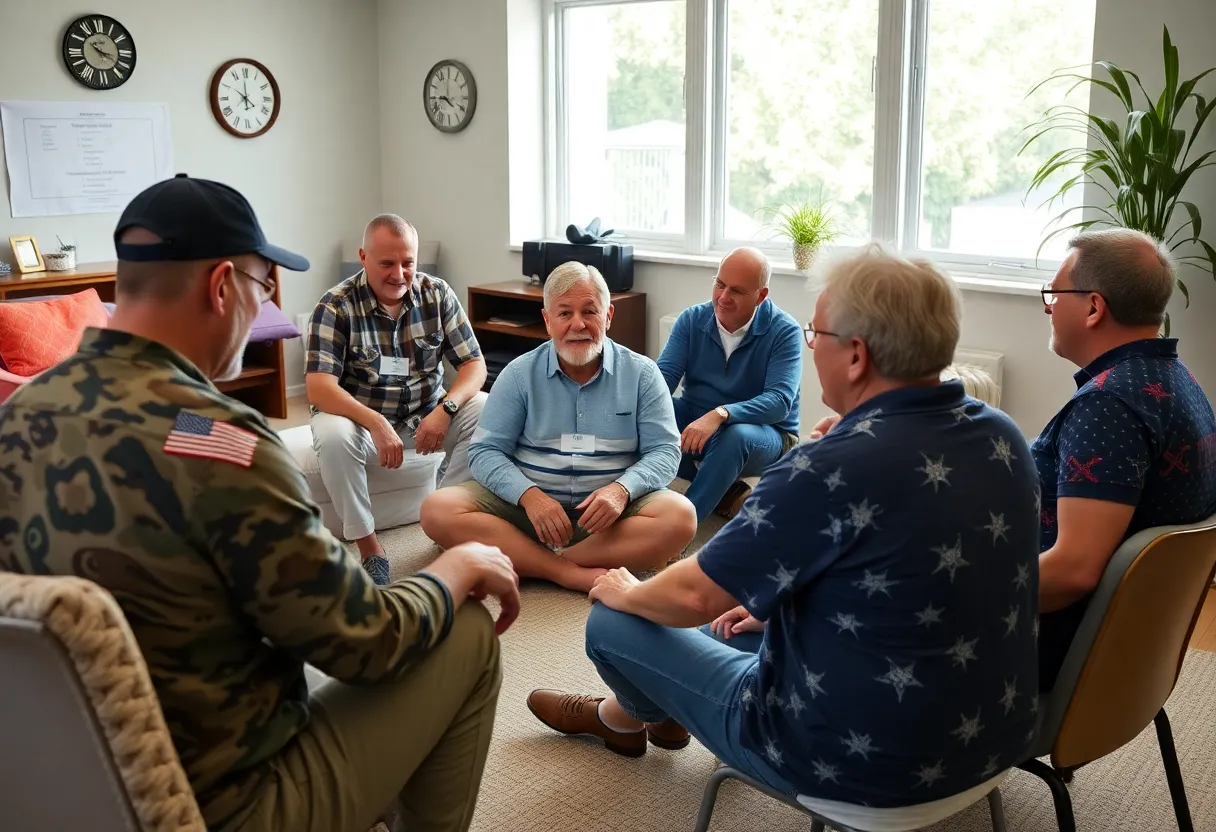News Summary
In Central Florida, a vast majority of veterans suffering from PTSD prefer virtual care over traditional treatments. This shift towards innovative therapies, including eTMS, highlights the urgent need for effective interventions. With alarming rates of veteran suicides and various therapies available, community support, and advocacy measures are essential for helping those who have served protect their mental well-being.
Orlando, Florida – A significant majority of Central Florida veterans suffering from Post-Traumatic Stress Disorder (PTSD) are now seeking innovative treatments for their long-term struggles. According to the Orlando Veterans Affairs Healthcare System, about 90% of veterans with PTSD prefer virtual care over traditional in-person treatment. This shift is driven by the desire for accessible and flexible options that cater to the unique needs of veterans.
Common symptoms of PTSD among veterans include avoidance, numbness, and a short temper, all of which can diminish personal connections and disrupt daily life. Many veterans, like Kevin Steinmann and Paul Mason, have experienced these debilitating symptoms for years. Steinmann, a disabled Army sergeant who has coped with PTSD for 25 years, has explored various treatment modalities, including service animals, medication, and therapy. Specific triggers, such as the sound of helicopters linked to his combat experience, cause him distress.
Mason, another veteran grappling with PTSD, finds loud and surprising sounds particularly challenging, making the transition to civilian life difficult. To help manage their symptoms and improve social interactions, both veterans participate in active police training simulations. Research from the Department of Veterans Affairs indicates that as many as 29% of veterans may develop PTSD at some point in their lives, highlighting the urgency of effective treatment interventions.
At the forefront of these interventions are established therapies recommended by experts like Dr. Laura Meyers, the coordinator for the PTSD Trauma Team at the Orlando VA. She identifies four main therapy types for PTSD: Prolonged Exposure (PE), Cognitive Processing Therapy (CPT), Eye Movement Desensitization and Reprocessing (EMDR), and Written Exposure Therapy (WET). Typically, treatment sessions last around 15 minutes, with many veterans requiring up to 20 sessions to realize full therapeutic benefits.
In addition to traditional therapies, advanced treatment options are becoming available. The newly launched eTMS Ohio clinic now offers non-invasive Electroencephalogram Transcranial Magnetic Stimulation (eTMS) therapy, aimed at alleviating PTSD symptoms along with other disorders. Combat veteran Dirk Harkins has credited eTMS therapy with saving his life after enduring 12 years of complications stemming from service-related trauma. Another patient at the eTMS clinic, Keenan Yoho, reported notable improvements in sleep quality and reduced hyper-vigilance since beginning treatment.
In Florida, which boasts the largest veteran population in the U.S. (approximately 1.4 million veterans), the focus on addressing PTSD is critical. Alarmingly, the rate of suicidal deaths among veterans in the state is about triple that of the general population, translating to around 17 veteran suicides per day. As the need for effective support grows, organizations like K9s For Warriors are doing their part by pairing veterans with service dogs, enhancing their quality of life and coping mechanisms for PTSD.
Additionally, Daniel Bean, the CEO of K9s For Warriors, is advocating for legislative measures such as the Service Dogs Assisting Veterans (SAVES) Act, which aims to fund training for service dogs specifically for veterans struggling with PTSD. The proposed SAVES Act outlines a five-year, $50 million grant program for nonprofits dedicated to providing service dogs to veterans in dire need of support.
As the Central Florida veteran community continues to navigate the complexities of PTSD, innovative treatment options and community support efforts represent a beacon of hope for many. These initiatives not only address immediate health concerns but also foster a supportive environment for those who have served their country.
Deeper Dive: News & Info About This Topic
HERE Resources
Additional Resources
- My News 13: Central Florida Veterans Share Struggles with PTSD
- Wikipedia: Post-Traumatic Stress Disorder
- Click Orlando: Orlando Veteran Uses Musical Talent to Cope with PTSD
- Google Search: PTSD treatment for veterans
- Florida Politics: New Central Florida Clinic for Veterans
- Encyclopedia Britannica: PTSD
- WESH: Marine Veteran Raises Domestic Violence Awareness
- Google Scholar: PTSD statistics in veterans
- Orlando Sentinel: Federal Funding for Veterans Service Dogs
- Google News: veterans PTSD innovative treatments

Author: STAFF HERE ORLANDO WRITER
ORLANDO STAFF WRITER The ORLANDO STAFF WRITER represents the experienced team at HEREOrlando.com, your go-to source for actionable local news and information in Orlando, Orange County, and beyond. Specializing in "news you can use," we cover essential topics like product reviews for personal and business needs, local business directories, politics, real estate trends, neighborhood insights, and state news affecting the area—with deep expertise drawn from years of dedicated reporting and strong community input, including local press releases and business updates. We deliver top reporting on high-value events such as Orlando International Fringe Theatre Festival, Megacon Orlando, and Central Florida Fair. Our coverage extends to key organizations like the Orlando Economic Partnership and Hispanic Chamber of Commerce Metro Orlando, plus leading businesses in leisure and hospitality that power the local economy such as Walt Disney World Resort, AdventHealth, and Universal Orlando. As part of the broader HERE network, including HEREJacksonville.com, HEREPetersburg.com, HERETallahassee.com, and HERETampa.com, we provide comprehensive, credible insights into Florida's dynamic landscape.





